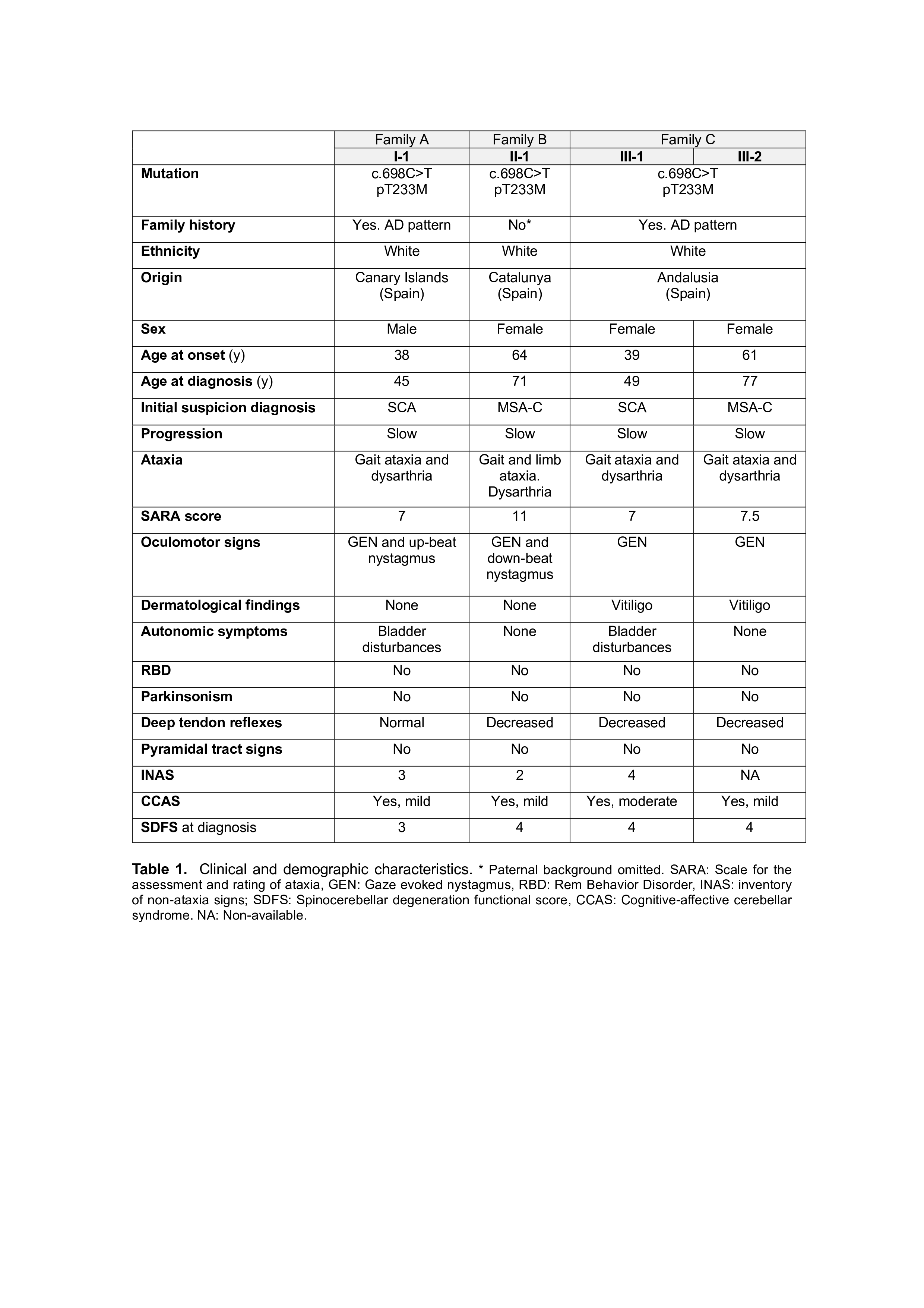Category: Ataxia
Objective: To describe the clinical and radiological characteristics of three independent families affected by SCA 34 due to a recently identified mutation in ELOVL4.
Background: Autosomal dominant spinocerebellar ataxia type 34 (SCA 34) has been linked to six missense mutations in the ELOVL4 gene. The initial characterization of this condition was made in a French-Canadian family presenting with cerebellar ataxia and erythrokeratodermia variabilis (EKV). Since then, a total of 60 cases have been reported, with the most prevalent clinical manifestations including slowly progressive cerebellar gait ataxia, dysarthria, and nystagmus. Radiologically, MRI shows global cerebellar and protuberance atrophy, often accompanied by Hot Cross Bun Sign (HCBS), a feature usually recognized as a marker of established MSA-C.
Method: A prospective study was conducted on patients affected by SCA34 who were followed in the ataxia unit of our hospital. Demographic variables, family history, and systematic neurological examinations were included. The SARA and SDFS scales were administered to measure severity, functionality, and progression. Neuroimaging data was also analyzed.
Results: Out of the 143 patients included in our hereditary cerebellar ataxia cohort, 4 were diagnosed with SCA34 (2.8%). These patients belonged to 3 distinct pedigrees originating from different regions of Spain. Whole exome sequencing identified the same mutation c.698C>T; pT233M in all cases.
Clinically, all patients exhibited slowly progressive cerebellar ataxia, dysarthria, and nystagmus, two had mild bladder disturbances. Cognitive-affective cerebellar syndrome (CCAS) was universally present. Remarkably, none of the patients presented EKV, while two from the same pedigree manifested vitiligo. [Table 1]
Neuroimaging revealed significant olivo-ponto-cerebellar atrophy (OPCA) in all patients accompanied by HCBS in three of them. [Table 2]
Conclusion: Our results contribute to expand the sample and clinical characterization of the missense mutation c.698C>T in the ELOVL4 gene. We confirm that the HCBS is a consistent sign of this mutation, probably much more sensitive than the dermatological finding of EKV.
Table 1
Table 2
To cite this abstract in AMA style:
G. Olmedo Saura, C. Pont Sunyer, I. Navalpotro Gomez, S. Bernal Noguera, B. Rodriguez Santiago, D. Guisado-Alonso, J. Pagonabarraga, C. García Sánchez, J. Kulisevsky, J. Perez Perez. Expanding the Phenotype of a Novel Mutation in ELOVL4 and the Differential Diagnosis of the Hot Cross Bun Sign [abstract]. Mov Disord. 2024; 39 (suppl 1). https://www.mdsabstracts.org/abstract/expanding-the-phenotype-of-a-novel-mutation-in-elovl4-and-the-differential-diagnosis-of-the-hot-cross-bun-sign/. Accessed February 14, 2026.« Back to 2024 International Congress
MDS Abstracts - https://www.mdsabstracts.org/abstract/expanding-the-phenotype-of-a-novel-mutation-in-elovl4-and-the-differential-diagnosis-of-the-hot-cross-bun-sign/


